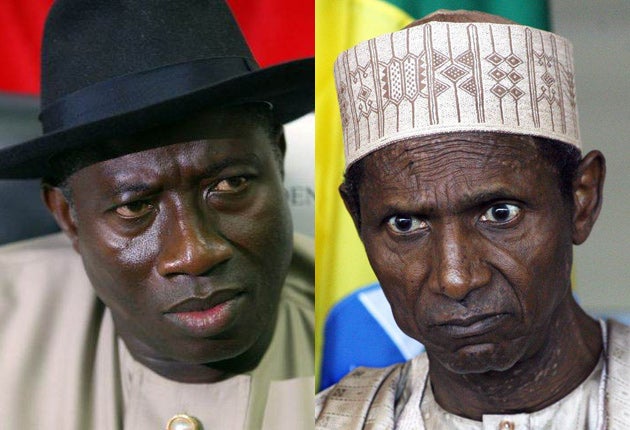Nigeria's ailing leader flies back under cover of darkness
Doubts remain about whether he is well enough to resume power amid fears of a power struggle with deputy

Nigeria is facing a new period of uncertainty after the sudden and secretive return of its seriously ill President cast doubt over who is charge of Africa's most populous country.
With the ink barely dry on the temporary handover of power to the Vice -President, Goodluck Jonathan, Omaru Yar'Adua has been rushed back to Nigeria amid concerns in his inner circle that he was in danger of being permanently ousted.
He arrived in the early hours of yesterday morning and was whisked to the presidential villa in Abuja by ambulance amid tight security and without any official government reception. The President's spokesman later issued a statement to confirm his return: "President Yar'Adua wishes to reassure all Nigerians that on account of their unceasing prayers and by the special grace of God, his health has greatly improved," it said.
His return, after a three-month absence and the continuing mystery surrounding his health, has raised the prospect of a damaging power struggle in Nigeria's ruling party. It could also threaten the delicate balance of power between the northern and southern halves of the oil rich country.
The presidential spokesman, Olusegun Adeniyi, confirmed that Goodluck Jonathan would continue in his role as acting President but gave no details of Mr Yar'Adua's medical condition. The statement also failed to refer to Mr Jonathan as the acting President, twice calling him the Vice-President, leading analysts to warn of a "subtle struggle" to follow between the two rival camps.
"Despite the show of harmony we have a situation in which the President is far too ill to govern and the Vice-President is far too constrained to govern," said Nambi Obasi, a senior analyst with the International Crisis Group. The prolonged absence of Nigeria's 58-year-old leader has triggered a constitutional crisis and led to governmental paralysis at a time when the Opec member faces multiple threats including a renewed rebellion in the oil-producing Niger Delta and the expiry of major oil contracts with foreign multinationals.
Mr Jonathan only assumed the acting presidency after weeks of intense pressure because the Vice-President is from the south of the country and his promotion violates a "gentleman's agreement" in the ruling party to alternate the presidency between the primarily Muslim north and the Christian-dominated South.
Despite his journey home, Mr Yar'Adua is said by sources close to the presidency to be unlikely to recover sufficiently to return to office and in no state, certainly at the moment, to oversee any government business.
The President's wife, Turai, is believed to have played a prominent role in his sudden return. Along with a trio of his senior advisors, she had reportedly become concerned about Mr Jonathan's assertive performance since he formally stepped up. The acting President has overseen a cabinet reshuffle and is being urged by some supporters to consider running for the top job in next year's elections.
Turai has become increasingly influential in her husband's affairs and is regarded as his senior advisor and caretaker. "His close circle want to hold on to power and privilege and they know that if he's gone they're gone," said ICG analyst, Mr Ofalo.
Some observers are concerned that distrust between north and south could provoke a split in the ruling party if Mr Goodluck were to run for the presidency. Such a split could threaten stability and widespread civil unrest in sub-Saharan Africa's second-largest economy.
The return clearly surprised the acting administration. A hurriedly convened cabinet briefing ended with Information Minister Dora Akunyili saying that Mr Jonathan had spoken to Mr Yar'Adua's aides and would meet his wife last night. It was clear that the acting president had still not seen his former boss.
"This is more about calculation and manipulation behind the scenes," said Elizabeth Donelly, Programme Director, Africa at the UK thinktank Chatham House. "No one knows what state Yar'Adua is in and it's going to be difficult for Jonathan to make decisions now."
Subscribe to Independent Premium to bookmark this article
Want to bookmark your favourite articles and stories to read or reference later? Start your Independent Premium subscription today.

Join our commenting forum
Join thought-provoking conversations, follow other Independent readers and see their replies